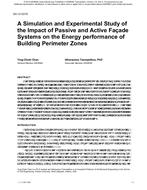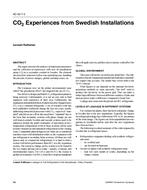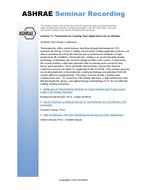The energy performance of a two-story occupied gas-heated house in Windsor, Ontario, Canada has been investigated by means of steady state and dynamic analyses of measured data. The experimental results were obtained from a monitoring study done on an hourly basis during a nine week period-during the winter of 1982-83. The measured values consisted of outdoor dry bulb temperature, wind direction and speed, total solar radiation on a horizontal surface, individual room temperatures, gas burner on-times, gross electrical input to the house, and on-times of the electrical clothes dryer which was vented to the outdoors. Reduction of the data in the steady state model indicates values of the building load coefficient, the net internal gains, and the balance point temperature for the house. The dynamic model was used to calculate a building load coefficient, thermal capacity, time constant and equivalent horizontal solar aperture.
The Computerized Instrumented Residential Audit (CIRA) simulation program was used to provide an estimation of similar thermal performance parameters by deterministic means based on an input description of the physical sizes and construction details of the house. Reasonably good agreement was found between these estimates and those derived from the measured data, thereby providing some credence for the use of both the steady state and dynamic thermal models in determining overall house performance parameters from hourly monitored data.
Citation: Symposium, ASHRAE Transactions, 1984, vol. 90, pt. 2B, Kansas City, MO
Product Details
- Published:
- 1984
- Number of Pages:
- 12
- File Size:
- 1 file , 860 KB
- Product Code(s):
- D-KC-84-01-3


